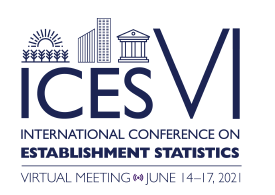All Times ET
Program is Subject to Change
TBD
UK Experience of Measuring Intangible Assets (307980)
*Josh Martin, UK Office for National StatisticsKeywords: intangibles, capital, intellectual property, productivity, digital, modern economy
The role of intangible assets in creating value in the modern economy is increasingly recognised, but measurement of their value and contribution are still in their infancy. This reflects a number of measurement challenges, characterised as ‘the three Fs’. First, data on intangibles are difficult to collect from businesses, as business accounting poses high hurdles for these assets to be recorded – as a result, business rarely have the information available to respond to business surveys. As a result, businesses often appear to give ‘inconsistent responses’ to survey questions. Businesses can be said to be forgetful when it comes to intangibles. Second, definitions of different intangible assets vary from researcher to researcher, and can often overlap or be unclear. While those assets included in the National Accounts have precise definitions, those measured outside the boundary do not. These terms, for businesses and researchers, are fuzzy. Finally, unlike most investments, the creation of intangible assets can take a long time. Most tangible assets can be made and purchased reasonably quickly, and the purchase date is clear for the business. In the case of intangibles, especially own-account investment (which is especially common for intangibles) the production process can be gradual over many periods. Asking business to provide investments in any given period can thus cause problems. The frequency of surveys could therefore be key. To meet these challenges, the UK Office for National Statistics (ONS) has an ambitious work programme to improve the measurement of intangible assets. ONS ran two business surveys about intangibles between 2009 and 2011, asking about investments and asset lives. The results did not accord with ‘macro-based’ estimates of intangible investment. ONS now produce regular estimates of intangible investment for the UK, and carry out a range of related research. This paper will recount the UK experience of measuring intangible assets.
